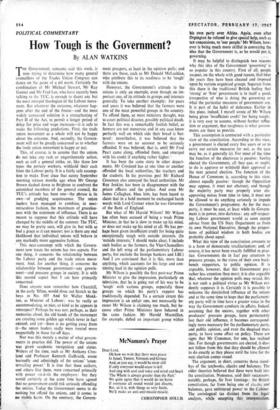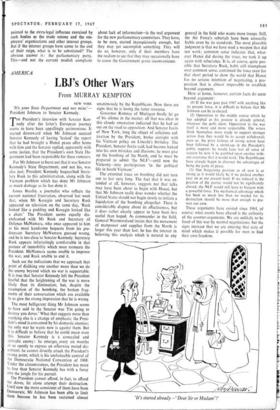How Tough is the Government?
POLITICAL COMMENTARY
By ALAN WATKINS
THE Government, someone said this week, is now trying to determine how many general councillors of the Trades Union Congress can dance on the point of a nil norm. Certainly the combination of Mr Michael Stewart, Mr Ray Gunter and Mr Fred Lee, who have recently been talking to the TUC, is enough to daunt any but the most intrepid theologian of the Labour move- ment. But whatever the outcome, whatever hap- pens after the end of the freeze—and the most widely canvassed solution is a strengthening of Part II of the Act, to permit a longer period of delay for price and wage increases—it is safe to make the following predictions. First, the trade union movement as a whole will not be happy about the outcome. And, secondly, the Govern- ment will not be greatly concerned as to whether the trade union movement is happy or not.
This, of course, is to assume that the unions do not take any rash or ungentlemanly action, such as call a general strike, or, like those low types the pottery workers, withhold their cash from the Labour party. It is a fairly safe assump- tion to make. Ever since that sunny September morning sixteen months ago when Mr George Brown dashed down to Brighton to confront the astonished members of the general council, the TUC's attitude has been one—the phrase is its own—of grudging acquiescence. The union leaders have managed to combine, in near- miraculous fashion, the maximum of graceless- ness with the minimum of influence. There is no reason to suppose that this attitude will have changed by the middle of the summer. The TUC, we may be pretty sure, will give in, but with as bad a grace as it can muster; nor is there any real likelihood that individual unions will behave in any markedly more aggressive fashion.
' This near-contempt with which the Govern- ment now treats the unions has two aspects. For one thing, it concerns the relationship between the Labour party and the trade union move- ment. And, for another thing, it concerns the relationship between government—any govern- ment—and pressure groups in society. It is with this second aspect that I am here primarily concerned.
Does anyone now remember how Churchill, in the early 'fifties, would doue out Scotch to the boys in No. 10? And Sir Walter Monk- ton, as Minister of Labour: was he really so accommodating, so nice, so kind as he appears in retrospect? Perhaps he was not; perhaps, as their memories cloud, the old hands of the movement are creating some golden age which never in fact existed; and yet—there is no getting away from it—the union leaders really were treated more respectfully in those far-off days..
Nor was this merely a matter of what govern- ments in practice did. The power of the unions was given academic recognition and status. Writers of the time, such as Mr Anthony Cros- land and Professor Kenneth Galbraith, wrote learnedly and admiringly of the unions' coun- tervailing power.' It is true that these authors, and others like them, were concerned primarily with power vis-a-vis the employers: but they would certainly at the same time have agreed that no government could risk seriously offending the unions. Today the Government seems to do nothing but offend the unions, and it comes to no visible harm. On the contrary, the Govern- ment prospers, at least in the opinion polls; and there are those, such as Mr Donald McLachlan, who attribute this to its readiness to be 'tough' with the unions.
However, the Government's attitude to the unions is only an example, even though an im- portant one, of its attitude to groups and interests generally. To take another example: for years and years it was believed that the farmers were one of the most powerful groups in the country. To offend them, so most ministers thought, was to court political disaster, possibly political death. In fact this was a remarkably foolish belief, as farmers are not numerous and in any case know perfectly well on which side their bread is but- tered: nevertheless, it was believed that the farmers were on no account to be seriously offended. It was believed, that is, until Mr Fred Peart came along, offended them, and emerged with his credit if anything rather higher.'
It has been the same story in other depart- ments. Mr Crosland has at one time or another offended the local authorities, *the teachers and the students. In his previous post Mr Richard Crossman also annoyed the local authorities. Mr Roy Jenkins has been in disagreement with the prison officers and the police. And even Mr James Callaghan, bless him, has been heard to claim that in a bold moment he exchanged harsh words with Lord Cromer when he was Governor of the Bank of England.
But what of Mr Harold Wilson? Mr Wilson has often been accused of being a weak Prime Minister, in that he is slow to make up his mind, or does not make up his mind at all. He has per- haps been given insufficient credit for being quite exceptionally tough with outside interests. (In 'outside interests,' I should make clear, I include such bodies as the farmers, the Vice-Chancellors and the left wing of the parliamentary Labour party, but exclude the foreign bankers and LBJ.) And I am convinced that it is this, more than anything, which accounts for his large and con- tinuing lead in the opinion polls.
Mr Wilson is possibly the first post-war Prime Minister to give the impression, particularly on television, that he is going out of his way to be 'tough' with various groups, especially those groups on which his party's support has traditionally depended. To a certain extent this impression is an unfair one, not necessarily be- cause Mr Wilson is claiming too much, but be- cause other Prime Ministers have behaved in the same fashion. Mr Harold Macmillan, for example, defied an important group within his own party over Afriea. Again, even after Orpington he refused to give special help, such as tax concessions, to 'our people.' Mr Wilson, how- ever is being much more skilful in conveying the idea that the Government is, as he would put it, governing.
It may be helpful to distinguish two reasons why this idea of the Government `governing' is so popular in this country. First of all, people suspect, on the whole with good reason, that bver , the years they have been cheated and imposed upon by various organised groups. Separate from this there is the traditional British feeling that `strong' or 'firm' government is in itself a good, irrespective of who is doing the governing or what the particular measures of government are.
It is part of the habit of deference. Earlier in this piece, indeed, I myself wrote of Mr Wilson being given 'insufficient credit' for being tough : it is very easy to assume, without further reflec- tion or argument, that toughness is what govern- ments are there to provide.
This assumption is connected with a particular view of the constitution. According to this view, a government is elected every five years or so to carry out certain measures (or not, as the case may be, as it generally is). For most of the time the function of the electorate is passive: having elected the Government, all they can, or ought, to do is approve or withhold their approval at the next general election. The function of the House of Commons is, according to this view, almost equally passive: though the Opposition may oppose, it must not obstruct; and though the majority party may properly utter dis- approving noises from time to time, it must not be allowed to do anything seriously to impede the Government's programme. As for the mass party, it must be cast, at least while its Govern- ment is in power, into darkness : any self-respect- ing Labour government would as soon accept advice from the US State Department as from its own National Executive, though the propor- tions of political wisdom in both bodies are probably about equal.
What this view of the constitution amounts to is a form of democratic totalitarianism; and, of course, it has never been exactly fulfilled in prac- tice. Governments do in fact pay attention to pressure groups, to the views of their own back- bench supporters, to public opinion. It is arguable, however, that this Government pays rather less attention than most; it is also arguable that, whatever the opinion polls may reveal, this is not such a political virtue as Mr Wilson evi- dently supposes it is. Certainly it is possible to • welcome the diminished influence of the unions and at the same time to hope that the parliament- ary party will in time have a greater voice in the way the Government conducts its affairs. Indeed, assuming that the unions, together with other producers' pressure groups, have permanently lost their old influence, it becomes correspond- ingly more necessary for the parliamentary party, and public opinion, and even the despised mass party, to have some effect on policy. There are signs that Mr Crossman, for one, has realised this. For though governments are elected, it does not follow from this that they should be allowed to do exactly as they please until the time for the next election comes round.
The argument, in short, concerns those stand- bys of the textbooks, checks and balances. The older theorists believed that these were built into the constitution, Nonsense, said their successors, notably, perhaps, Sir Ivor Jennings : the British constitution, far from being one of cht.cks and balances, gave unfettered power to the Cabinet. The sociological (as distinct from the legal) analysts, while accepting this interpretation, pointed to the extra-legal influence exercised by such bodies as the trade unions and the em- ployers' organisations and other interest groups. But if the interest groups have come to the end of their reign, what is to be substituted? The obvious answer is: the parliamentary party. This—and not the current modish complaint
about lack of information—is the real argument for the new parliamentary committees. They have, to be sure, started inauspiciously enough, but they may yet accomplish something. They will do so, however, only if their members have the realism to see that they may occasionally have to cause the Government grave inconvenience.






























 Previous page
Previous page